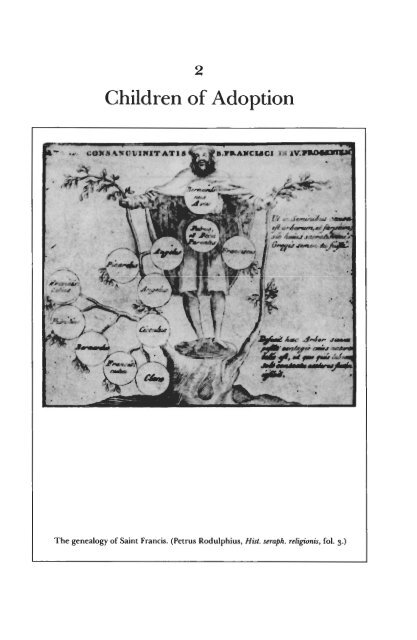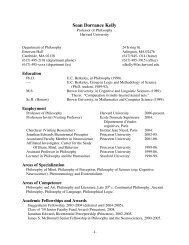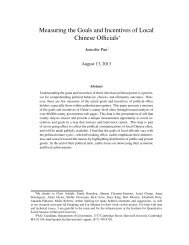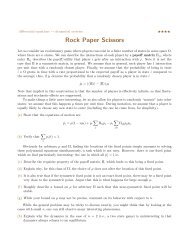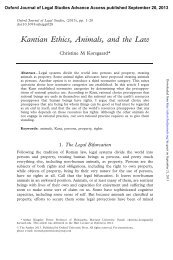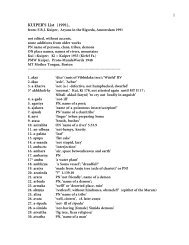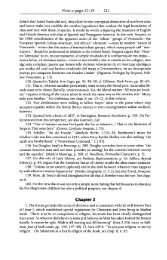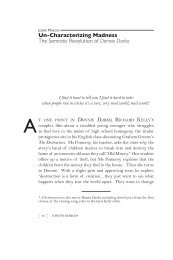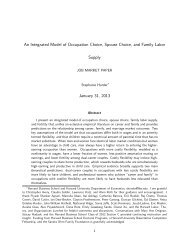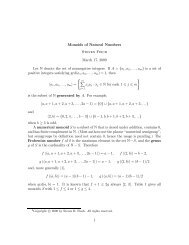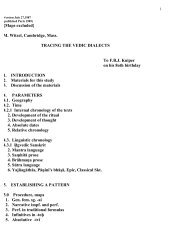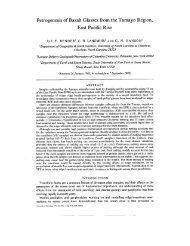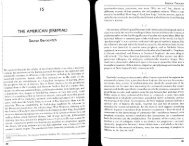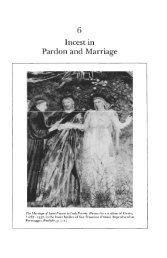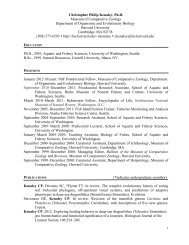Children of Adoption - People Fas Harvard
Children of Adoption - People Fas Harvard
Children of Adoption - People Fas Harvard
Create successful ePaper yourself
Turn your PDF publications into a flip-book with our unique Google optimized e-Paper software.
<strong>Children</strong> <strong>of</strong> <strong>Adoption</strong><br />
The genealogy <strong>of</strong> Saint Francis. (Petrus Rodulphius, Hid. seraph. rcligirmis, fol. 3.)
By that meanes becommeth he the dear brothere,<br />
sister, and mother <strong>of</strong> Christ, . . . a cytizen <strong>of</strong> heaven<br />
with the Apostles and Prophetes, yea, the chylde <strong>of</strong><br />
adopcyon and heyre togyther with Christ in the<br />
heavenly inherytaunce. . . . No soch chyldren left<br />
Socrates behynd hym, neyther yet Demosthenes, nor<br />
Plato, nor Cicero, with all their plesant wysdome and<br />
eloquence.<br />
John Bale'
CHRISTIAN ETHICS has been a major<br />
concern in the criticism <strong>of</strong> Measure for Measure, yet Christian monachal<br />
institutions have rarely been considered an essential element in<br />
the play.2 Despite the fact that the friar disguise was rare in Elizabethan<br />
drama and was generally attacked as silly, few critics have<br />
speculated about why Shakespeare should have changed the merchant<br />
disguise used by the incognito kings who may have been his<br />
sources for Vincentio's device.' Likewise, some have seen Isabella's<br />
novitiate as signifying only a desire for chastity, even though the chaste<br />
women who are her counterparts in the sources are not nuns: Shakespeare's<br />
use <strong>of</strong> the orders in the play has even been considered antimonachal<br />
ati ire.^<br />
Shakespeare's attitude toward the orders cannot have been independent<br />
<strong>of</strong> his own religious beliefs, but his religion is a vexed question.<br />
His father John may have been a recusant Catholic, and some<br />
have argued that, for at least a portion <strong>of</strong> his life, Shakespeare himself<br />
was Cath~lic.~ (The birth <strong>of</strong> his son Hamnet fewer than nine months<br />
after his public marriage to Anne Hathaway, for example, has been<br />
used to argue for an earlier, clandestine marriage, presumably performed<br />
by a Catholic priest.)' Moreover, there were two sixteenthcentury<br />
nuns named Shakespeare in the Benedictine convent at Wroxall,<br />
just north <strong>of</strong> Stratford: Joan Shakespeare, who was sub-prioress at<br />
the time <strong>of</strong> the Dissolution and who lived until 1576 (the year William<br />
Shakespeare was twelve); and Isabella Shakespeare, who was prioress<br />
in the early years <strong>of</strong> the cent~ry.~ (The latter may be among the sources<br />
for the name <strong>of</strong> Measure for Measure's Isabella, although there are<br />
other possibilities.)<br />
If Shakespeare was raised a Catholic, he would have been especially<br />
sensitive to the confrontation between Catholicism and Protestantism.<br />
In our play, quasi-Brother Vincentio's proposal to quasi-Sister Isabella<br />
echoes that confrontation: the Reformation had ended clerical celibacy,<br />
and Luther himself married a nun. I cannot presume to argue<br />
definitively one way or another the question <strong>of</strong> Shakespeare's religion,
<strong>Children</strong> <strong>of</strong> <strong>Adoption</strong><br />
but the evidence does suggest that he may have been intellectually<br />
closer to the Catholic than to the Protestant position on the celibate<br />
orders.<br />
Thus we should not be surprised that in Measure for Measure an ex-<br />
amination <strong>of</strong> sexuality implies a searching and sympathetic depiction<br />
<strong>of</strong> the monachal orders. Indeed, the role <strong>of</strong> the orders in Measurefor<br />
Measure is crucial to what the play suggests about the organization <strong>of</strong><br />
human sexuality. It exposes, not the Catholic Church, as in a Protes-<br />
tant satire, but the psychological, historical, and theological grounds <strong>of</strong><br />
monachal relationships by reinterpreting the religious orders in light<br />
<strong>of</strong> the awesome tension between nature and law, incest and chastity.<br />
The Sexual Dimension <strong>of</strong> the Religious Orders<br />
We see, then, that savages have an unusually great horror<br />
<strong>of</strong> incest or are sensitive on the subject to an unusual de-<br />
gree, and that they combine this with a peculiarity which<br />
remains obscure to us-<strong>of</strong> replacing real blood-relationship<br />
by totem kinship. This latter contrast must not, however, be<br />
too much exaggerated, and we must remember that the<br />
totem prohibitions include that against real incest as a spe-<br />
cial case. Freud, Totem and Taboog<br />
Totemic tribes that enjoin exogamy (marriage outside the tribe) and<br />
allow for the existence <strong>of</strong> other totemic tribes can thereby avoid incest.<br />
However, a tribe that believes its totem to be universal and all other<br />
human beings to be part <strong>of</strong> itself (or, teleologically speaking, potential<br />
converts to its universalist doctrine) makes exogamy impossible and<br />
all intercourse incestuous. Christianity calls for the universal brother-<br />
hood <strong>of</strong> man and, in its proselytizing character, claims to treat as<br />
brothers even those who believe themselves to be non-Christians. The<br />
Christian monachal orders are microcosms <strong>of</strong> a potentially Universal<br />
Siblinghood in which kinship has a special significance. Freud re-<br />
marks that terms like "Sisters in Christ" have analogues in societies<br />
where kinship terms "do not necessarily indicate any consanguinity, as<br />
ours would do: they represent social rather than physical relation-<br />
ships."1° But the monachal use <strong>of</strong> such terms assumes more than the<br />
replacement <strong>of</strong> "physical" relationships by social ones: it assumes the<br />
conflation <strong>of</strong> social or theological with biological relationships.<br />
As, according to Freud, social taboo parallels individual obsessional<br />
neurosis," so the anti-fornication, or anti-incest, taboo that underlies<br />
the laws <strong>of</strong> Shakespeare's Vienna parallels the neurosis that can un-<br />
derlie both the fear <strong>of</strong> incest and the desire to engage in a sacred in-
<strong>Children</strong> <strong>of</strong> <strong>Adoption</strong><br />
cest. The very term "taboo" means both "sacred, consecrated" and<br />
"dangerous, forbidden." l2 "Isabella," like "Elizabeth," means "conse-<br />
crated to God" (from Hebrew elishabet);" as a Sister, one who violates<br />
the taboo on incest by marrying the Son <strong>of</strong> her Father, Isabella is both<br />
sacred and taboo. (According to Freud, a nun's virginity is in itself a<br />
kind <strong>of</strong> taboo act.)14 "Anyone who has transgressed one <strong>of</strong> these pro-<br />
hibitions . . . acquires the characteristic <strong>of</strong> being prohibited," writes<br />
Freud;15 Lucio acknowledges a taboo on Isabella as "a thing enskied"<br />
(1.4-34).<br />
Familial Sisterhood and Universal Sisterhood. However sexually in-<br />
experienced Isabella may be, a Clarist novice such as Isabella would<br />
probably not be totally innocent <strong>of</strong> contact with, or speculation about,<br />
sex.'= It is pointless to follow Lucio's lead in greeting her ambiguously<br />
as "virgin, if you be" (1.4.16), for she undoubtedly lacks the practical<br />
sexual experience <strong>of</strong> such other nuns as Aemilia, the abbess at Ephe-<br />
sus in The Comedy <strong>of</strong> Errors, or Thaisa, the mother who joins Diana's<br />
vestal virgins in Pericles. (Both women have had earthly husbands.) Yet<br />
Isabella must have the knowledge <strong>of</strong> secular love that everyone ac-<br />
quires by wondering about sexual conduct and kinship relations within<br />
an earthly family. In the course <strong>of</strong> the play, Isabella responds to that<br />
universally available knowledge; since she conducts her life some-<br />
where between the earthly family that a novice plans to leave and the<br />
heavenly family that a novice plans to join, her response distinguishes<br />
her among women.<br />
The play amply documents Isabella's theoretical knowledge <strong>of</strong> the<br />
facts <strong>of</strong> life. She raises the question <strong>of</strong> Claudio's legitimacy (3.1.140)<br />
and all too promptly understands the nature <strong>of</strong> Claudio's <strong>of</strong>fense, as-<br />
sociating it with Juliet (1 .4.45).17 But her distinctive sensitivity to the<br />
general Viennese malaise about legitimacy and incest is better re-<br />
flected in the fact that she immediately links his act with kinship terms<br />
by referring to "my cousin Juliet" (1.4.45). Even Isabella's appar-<br />
ently reassuring response to Lucio's immediate question, "Is she your<br />
cousin?"-she says, "Adoptedly, as schoolmaids change their names /<br />
By vain though apt affection" (1.4.46-48)-is discomforting because<br />
the exchange reminds us that no one, especially in licentious Vienna,<br />
can know absolutely who his consanguineous parents are. Beyond the<br />
epistemological question <strong>of</strong> legitimacy, the interchange <strong>of</strong> names be-<br />
tween Isabella and Juliet suggests an incestuous conflation <strong>of</strong> Claudio's<br />
sister and his lover; had Juliet been adopted by law rather than in<br />
name or by affection, intercourse with Claudio might also have been<br />
incest, since the canon laws frequently barred relatives by legal adop-<br />
tion from sexual cornmer~e.'~
<strong>Children</strong> <strong>of</strong> <strong>Adoption</strong><br />
Isabella's reference to adoption is loaded in another way, as well. It<br />
echoes the terms used to describe God's relationship to Christian be-<br />
lievers: "We ourselves groan within ourselves, waiting for the adop-<br />
tion, to wit, the redemption <strong>of</strong> our body" (Rom. 8 : 23, cf. Rom. 8: 15).<br />
The fact that Isabella is on the verge <strong>of</strong> publicly declaring her alle-<br />
giance to a heavenly family as a Sister reminds us <strong>of</strong> her status-and<br />
the status <strong>of</strong> all the play's characters-as children by adoption <strong>of</strong> God.<br />
By fornicating and bastardizing, secular Vienna has reached an ex-<br />
treme <strong>of</strong> exogamy, where the threat <strong>of</strong> unrecognized blood relation-<br />
ship has become so pervasive that if one wishes to be chaste one must<br />
marry out or marry not at all. Thus Barnardine the native Bohemian<br />
and foreigner to Vienna is for Isabella (or any other Viennese woman)<br />
the only certainly eligible bachelor in the city-and he is condemned<br />
to die.<br />
The theme <strong>of</strong> ubiquitous incest similarly informs Hamlet. Claudius,<br />
like Cain, has killed his brother and, like Henry VIII, has married his<br />
sister-in-law-incestuously, Hamlet insists (HAM 3.3.90). Yet for Ham-<br />
let (as, we speculate, for Isabella) the problem is more pervasive-any<br />
person who marries becomes "a breeder <strong>of</strong> sinners" (HAM 3.1.122).<br />
That is why he counsels his beloved Ophelia (in the sources she is his<br />
collactaneous sister)Ig to enter a nunnery: "I say we will have no more<br />
marriage. Those that are married already-all but one-shall live.<br />
The rest shall keep as they are. To a nunnery, go." (HAM 3. I .147-49.)<br />
If Isabella had Hamlet's remarkable self-knowledge, she might well<br />
recoil like him from the taint <strong>of</strong> any implication whatsoever in human<br />
sexuality: "I am myself indifferent honest, but yet I could accuse me<br />
<strong>of</strong> such things that it were better my mother had not borne me" (HAM<br />
3.1.122-24).<br />
Much Ado's Beatrice touches on the distinctive source <strong>of</strong> Isabella's re-<br />
action when she says, with a clever pun on Isabella's chosen pr<strong>of</strong>es-<br />
sion: "I'll none. Adam's sons are my brethren, and truly I hold it a sin<br />
to match in my kindred." (ADO 2.1.63-64.) The pun on "none" and<br />
"nun" also appears in Angelo's injunction to the novice Isabella, "Be<br />
that you are, 1 That is, a woman; if you be more, you're none" (2.4.133-<br />
34), and in the dialogue between Hamlet and the "gravemaker" who is<br />
digging a grave for Ophelia:<br />
Hamlet. What man dost thou dig it for? (HAM 5.1.121)<br />
Clown. For no man, sir.<br />
Hamlet. What woman then?<br />
Clown. For none neither.<br />
Hamlet. Who is to be buried in 't?<br />
Clown. One that was a woman, sir; but, rest her soul, she's dead.
<strong>Children</strong> <strong>of</strong>' <strong>Adoption</strong><br />
In Hamlet, as in Antigone, not death to the world and spiritual mar-<br />
riage to Jesus (i.e., entering a nunnery, which in some orders entailed<br />
a service for the dead before rebirth and marriage to Jesus), but be-<br />
coming nothing in death homogenizes the members <strong>of</strong> the domestic<br />
household.* In Measure for Measure, by contrast, from the virtual inevi-<br />
tability <strong>of</strong> incest and lack <strong>of</strong> restraint that she sees almost everywhere<br />
in the secular world, Isabella seeks refuge in an institution where,<br />
more subject to a Mother Superior than to the memory <strong>of</strong> a conceiv-<br />
ably adulterous mother and more subject to Brothers than to a lecher-<br />
ous brother, she hopes to transcend sexual desire and specific famil-<br />
ial blood ties. She seeks to become a "chylde <strong>of</strong> adopcyon" (Rom. 8: 23,<br />
trans. John Bale) to God.<br />
To take vows in a Sisterhood is radically to change one's relationship<br />
to everyone in the world, including the members <strong>of</strong> one's blood family.<br />
"If any one comes to me and does not hate his own father and mother<br />
and wife and children and brothers and sisters, yes, and even his own<br />
life," said Jesus, "he cannot be my disciple" (Luke 14: 26; Rev. Stand.).20<br />
Pope Innocent IV's description <strong>of</strong> how Saint Clare divorced her earthly<br />
family before joining the heavenly one is thus typical <strong>of</strong> Christian<br />
morlachal tradition:<br />
Meditating on this verse <strong>of</strong> the Prophet, "0 daughter, hear, see, and listen,<br />
forget your people and the house <strong>of</strong> your father, because the King has de-<br />
sired your beauty," the Blessed Clare <strong>of</strong> saintly memory . . . turned her back<br />
to fleeting, and transitory things. Divesting herself <strong>of</strong> herself, her parents,<br />
and <strong>of</strong> all things, and making herself a daughter <strong>of</strong> the celestial Kingdom, she<br />
elected and named as her spouse the poor Jesus Chri~t.~'<br />
Before entering a Christian Sisterhood and becoming a child <strong>of</strong> adop-<br />
tion to God, a woman is allowed to distinguish brothers from others<br />
*In Hamlet, ambiguous family relationships become inseparable from ambiguous<br />
political relationships. This conflation is summed up in the figure <strong>of</strong> Gertrude, who<br />
stands to the political ruler in the same mixture <strong>of</strong> relations as a nun stands to God,<br />
being not only ambiguously sister and wife <strong>of</strong> Claudius but also mother <strong>of</strong> the potential<br />
king Hamlet. In one <strong>of</strong> Shakespeare's sources (Belleforest, Histoires tragigues, 5th series,<br />
gd story, chap. I), she is also the daughter <strong>of</strong> a king, from whom she receives the king-<br />
dom as a kind <strong>of</strong> dowry. Thus she is "imperial jointress to . . . the state" both as a<br />
woman who has a "'joint' tenancy in an estate" (cf. Coke, On Littleton, L. I ; C. 5; 36.D) in<br />
such a way that he who would be king <strong>of</strong> the state rrlust marry its queen, or kill her-<br />
thus being in the same position as Jocasta-and as a woman who conjoins the vari-<br />
ous successivc parts <strong>of</strong> the royal family and hence <strong>of</strong> the state. Tellingly, on entering<br />
Gertrude's chamber, Hamlet compares himself to Nero: "Let not ever 1 The soul <strong>of</strong><br />
Nero enter this firm bosom" (HAM 3.2.378-79). Nero's incest with his mother, Julia<br />
Agrippina Minor, conflated in his person two <strong>of</strong> her relations as mother, sister, wife,<br />
and daughter <strong>of</strong> emperors; he enacts both the incest Hamlet may fear he desires and<br />
the matricide Hamlet may fear he will commit. Scc my forthcoming essay "Hoodman<br />
Blind."
<strong>Children</strong> <strong>of</strong> <strong>Adoption</strong><br />
and to treat them differently; indeed, for family purposes <strong>of</strong> marriage<br />
a laywoman is obliged to distinguish between a blood brother and<br />
other men, just as for state purposes <strong>of</strong> war she is obliged to distinguish<br />
between fellow citizens and aliens. As a novice in the Sisterhood<br />
<strong>of</strong> the Clares Isabella at the beginning <strong>of</strong> the play has presumably begun<br />
to learn how to transcend the distinction between brothers and<br />
others in both familial and political realms. (A member <strong>of</strong> an order<br />
must put into practice the Christian prescription that Christians should<br />
be "no more-strangers and foreigners, but fellow citizens with the<br />
saints" [Eph. 2: 191, hence above earthly international wars.) She<br />
should have begun to think and act as though all men were equally<br />
her brothers.*<br />
Sharing Hamlet's recognition <strong>of</strong> the pervasive taint <strong>of</strong> familial sexual<br />
sin, Isabella is in the position <strong>of</strong> Antigone, caught between horror<br />
at sexual transgression and pious duty to a family constituted (actually<br />
for Antigone, potentially for Isabella) by such transgressi~n.~~ But her<br />
attempt to flee from the urban brothel-in-potentia to the Sisterhood,<br />
from mother and father to Mother superior and Pope, merely relocates<br />
the problem <strong>of</strong> incest from the consanguineous family to the<br />
Christian Family, for the Christian rejection <strong>of</strong> blood family makes all<br />
sexual intercourse sibling incest. This is quintessentially true for a<br />
monk or a nun, and it is <strong>of</strong>ficial Church doctrine that "concubinage or<br />
marriage with a person consecrated to God" is not merely fornication<br />
but ince~t.~' The rejection <strong>of</strong> parenthood entails that all humansparents,<br />
siblings, spouses-become wholly "children <strong>of</strong> your Father<br />
which is in heaven" (Matt. 5: q5).t To Tiresias' formal and political<br />
*The commandment to divorce one's earthly family is to be interpreted literally.<br />
(One purpose <strong>of</strong> "dying to the world," as do Catholic celibates, is to signal that divorce.)<br />
According to Saint Anthony, remembering one's relatives is a temptation <strong>of</strong> the devil<br />
(Athanasius [?I, Vila Antoniz, PL, 73 : 36. and Sulpicius, Dialogues, I : 22). The fifth-<br />
century abbot Saint John Cassian reports that the abba Apollos refused to go to his fa-<br />
ther\ funeral, pleading that he himself had been "dead to this world for twenty years";<br />
the same Apollos refused to help his brother save an ox in a swamp (Cassian, Con-<br />
ferences, 24:g). Herbert Workman cites a similar story <strong>of</strong> religious flight from con-<br />
sanguineous kin recorded in the Pat~ologia: "Pior, an Egyptian monk, for fifty years<br />
refused to see any member <strong>of</strong> his family, even when they came to visit him. When,<br />
on her appeal, his bishop at length bade him visit his sister, he obeyed, but took care,<br />
writes his admiring biographer, to keep his eyes closed all the time" (Monastic Ideal,<br />
pp. 59-60. drawing on Verba Seniorurn, PL, 73 : 759, and Palladius, Historia Lawiaca, 39,<br />
PC, 34 : gg 1 - 1262).<br />
tone parallel in Shakespeare to the Catholic ceremony in which a woman takes leave<br />
<strong>of</strong> her earthly family ("dies to the world") and enters the heavenly family ("is reborn")<br />
by becoming the wife, sister, daughter, and mother <strong>of</strong> God is the scene in which<br />
Coriolanus, banished by the Romans and "servanted to others" (i.e., to the Volscians;<br />
COR 5.2.84). attempts to cast <strong>of</strong>f his "father" Menenius Agrippa and claims that he<br />
no longer knows "wife, mother, child" (COR 5.2.71 and 5.2.83; cf. 5.3.10). Compare
<strong>Children</strong> <strong>of</strong> <strong>Adoption</strong><br />
question "Who is your father?," then, all Christians should answer<br />
"Father."<br />
Brother and Sister Saints<br />
That Shakespeare has the sister in Measure for Measure enter a Sisterhood<br />
involves the theme <strong>of</strong> homogeneous liberty (equality and fraternity)<br />
that is crucial to monachism and its essential opposition to the<br />
political order. That Shakespeare then has his sister-in-training leave<br />
the Sisterhood on behalf <strong>of</strong> a brother suggests that she still loves, or<br />
can love, her brother unequally-either more than others or differently<br />
from others-and at the same time it foreshadows the possibility<br />
<strong>of</strong> a reinstatement <strong>of</strong> political, or parentarchal, heterogeneity. What<br />
might mediate between the positions <strong>of</strong> homogeneity in liberty and<br />
heterogeneity in parentarchy is, from a general sociological viewpoint,<br />
the practice <strong>of</strong> sibling incest <strong>of</strong> the sexual kind. But no one is<br />
allowed to practice such incest in an unmediated way. In theory, therefore,<br />
the love <strong>of</strong> blood relatives might combine with the fear <strong>of</strong> earthly<br />
incest and make for an individual's decision to join a monastic order<br />
or even to found one.<br />
Historically, earthly sibling love and heavenly Sibling love have<br />
<strong>of</strong>ten been joined in the same persons. In Christian hagiography, a<br />
saintly person's intense earthly sibling love is <strong>of</strong>ten followed by an extraordinary<br />
Sibling love <strong>of</strong> all human beings, just as if each and every<br />
human being had become a brother or si~ter.~The Acts <strong>of</strong> the Saints<br />
includes more than 150 men and women who were brother and sister<br />
as well as Brother and Sister.25 Sibling celibates appear from the very<br />
beginning <strong>of</strong> Christian monachism: Saint Anthony, traditionally the<br />
first Christian monk, placed his sister in a nunnery when he left the<br />
world for the ascetic life.2G More strikingly, brother-sister liaisons<br />
played an important role in the historical beginnings <strong>of</strong> the Christian<br />
orders, for the sister <strong>of</strong> each <strong>of</strong> the three great cenobitical founders,<br />
Saint Pachomius, Saint Basil, and Saint Benedict, helped to preside<br />
over a community <strong>of</strong> nuns that followed an adaptation <strong>of</strong> her brother's<br />
rules for monks.27<br />
Earthly sibling and Christian Sibling love figured in the lives <strong>of</strong><br />
many great saints. Saint Benedict-founder <strong>of</strong> the order in which Isa-<br />
Volumnia's remark that Coriolanus is no longer akin to his Roman mother, wife, and<br />
child, and other repetitions <strong>of</strong> the same motif (5.3.178-80, 5.3.101-3) Coriolanus<br />
claims that he has no family at all and allies his rejection <strong>of</strong> ordinary kinship with the<br />
atheist or arrogantly isotheist hypothesis that "a man [is] author <strong>of</strong> himself 1 And<br />
[knows] no other kin" (5.3.36-37).
<strong>Children</strong> <strong>of</strong> <strong>Adoption</strong><br />
bella Shakespeare was prioress and in which Clare once served, and<br />
author <strong>of</strong> the strict Regula monachorum-visited his sister, Saint Scholastica,<br />
once a year. On the last <strong>of</strong> these visits, according to Saint Gregory<br />
the Great's biography, Scholastica entreated Benedict to stay the<br />
night. When he adamantly refused, she fell to prayer until a sudden<br />
storm arose, so that she had her way. The consummation <strong>of</strong> that night,<br />
spent all in spiritual conversation, could be seen as the incorporation<br />
and transcendence <strong>of</strong> any earthly attraction, physical or otherwise,<br />
that might have existed between the brother and sister. Three days<br />
later, Scholastica died; in the course <strong>of</strong> time, Benedict joined her in a<br />
single grave.28<br />
Legends about Gregory the Great's own life involve incest and the<br />
wonderful atonement for incest. As Hartmann von Aue tells the story,<br />
Gregory was the child <strong>of</strong> a brother-sister union and unknowingly<br />
married his own mother. When he became Pope (the first monk ever<br />
to do so) he forgave his mother's incest and his own, restored Benedic-<br />
tine discipline, and enforced the rule <strong>of</strong> celibacy for the ~1erg-y.~~ This<br />
Christian solution-repentance and atonement-to the Oedipal situation<br />
suggests that the Catholic orders made possible an atonement for<br />
the desire for incest or unchastity, even when the actual act was not in<br />
question. The Holy Family atones for the earthly one by making all<br />
even.<br />
Some brother and sister saints voiced explicit concern for their siblings'<br />
sexuality, at times in terms that border on identification and possessiveness.<br />
In his Rule, or Book on the Institute <strong>of</strong> Virgzns and on the Contempt<br />
<strong>of</strong> the World, for Sister Florentine, Saint Leander identifies his<br />
sister's virginity with the goal <strong>of</strong> the entire Church: "It is above the<br />
skies that we must seek the true wealth, the gift <strong>of</strong> holy virginity. . . .<br />
What all the saints hope one day to be, what the entire Church expects<br />
to become after the resurrection, thou art already. . . . Christ is already<br />
thy spouse, thy father, thine inheritance, thy ransom, thy Lord,<br />
thy God."50 Yet exhorting his saintly sister as Sister to marry the Son <strong>of</strong><br />
her Father, Leander expresses a more specific self-interest in safekeeping<br />
her virginity: "Ah, well-beloved sister, understand the ardent<br />
desire which inspires the heart <strong>of</strong> thy brother to see thee with Christ.<br />
. . . Thou art the better part <strong>of</strong> myself. Woe to me if another take thy<br />
cro~n."~' In the monastic life into which he sends her, Florentina's<br />
earthly crown will be Leander's as much as any man's.<br />
In an epitaph composed for the tombstone <strong>of</strong> his sister Saint Irene,<br />
Saint Damasus expressed a similar proprietary interest: "A witness <strong>of</strong><br />
our love (our mother), / upon leaving the world, / had given thee, my<br />
blood sister, to me as a pure pledge."52 Such concern with a sibling's
<strong>Children</strong> <strong>of</strong> <strong>Adoption</strong><br />
chastity was not confined to men. When Saint Lioba, a Sister, sought<br />
to serve her cousin Saint Boniface, she wrote him, "God grant, unwor-<br />
thy as I am, that I might have the honor <strong>of</strong> having you for my brother."<br />
She closed the letter with the following suggestive verse:<br />
May the Almighty Judge, who made the earth<br />
And glorious in His kingdom reigns,<br />
Preserve your chaste fire warm as at its birth,<br />
Till time for you shall lose its rights and pains."<br />
The sixteenth-century Saint Teresa <strong>of</strong> Avila, who had nine beloved<br />
brothers, ran away from home with one brother, Rodrigo, at the age<br />
<strong>of</strong> seven, and with another, Antonio, at the age <strong>of</strong> twenty, to a Carmelite<br />
convent.34 Originally Teresa had wanted Antonio to become a<br />
Brother and herself a Sister,35 but in her Life she seems to forget Antonio<br />
as brother from the moment she enters the Sisterhood. In her<br />
Meditations on the Song <strong>of</strong> Songs (1 566), Teresa seeks to replace the fraternal<br />
love she once had for Antonio by "spiritual marriage" and rebirth<br />
into a family where earthly kinship distinctions do not exist. Just<br />
such a transcendence <strong>of</strong> consanguinity was Teresa's essential goal for<br />
the Discalced Carmelite Order that she helped to found. Teresa writes,<br />
"For the love <strong>of</strong> the Lord refrain from making individual friendships,<br />
however holy, for even among brothers and sisters such things are apt<br />
to be poison~us."~~ Reminding her Sisters to "think <strong>of</strong> the brotherhood<br />
which you share with this great God" as "children <strong>of</strong> this God,"37<br />
she exhorts them, and all Christians, "to make our actions conform to<br />
our words-in short, to be like children <strong>of</strong> such a Father and the<br />
brethren <strong>of</strong> such a Brother."" Saint John <strong>of</strong> the Cross, an ideological<br />
mainstay <strong>of</strong> Teresa's order, wrote in his Precautions, "You should have<br />
an equal love for or an equal forgetfulness <strong>of</strong> all persons, whether<br />
relatives or not, and withdraw your heart from relatives as much as<br />
from ~thers."~Vn precisely this way Teresa erased and raised herself<br />
above differences between family and nonfamily. The saintly Teresa,<br />
who verges in her Life on confessing to spiritual incest-a biographer,<br />
pressing too hard, might conclude that she made love with a certain<br />
Dominican Brotherio-came to accept the ordinary taboo on sexual<br />
intercourse with a brother only when she accepted the extraordinary<br />
taboo on sexual intercourse with any human being.<br />
As everloving Brothers and Sisters, such loving brothers and sisters<br />
came close to marriage without violating the law against physical incest.<br />
A few Catholic orders allowed closer physical communication between<br />
siblings or Siblings in "double cloistersm-monasteries and nunneries<br />
standing side by side. Among the Faremoutiers, who first developed
<strong>Children</strong> <strong>of</strong> <strong>Adoption</strong><br />
double cloisters in the seventh century, Saint Cagnoald ruled the<br />
monks in one wing and his sister, Saint Burgund<strong>of</strong>ara, ruled the nuns<br />
in the ~ther.~' The Order <strong>of</strong> Fontevrault and the Brigittines adopted<br />
the same organizati~n.~~ (For the mortification <strong>of</strong> the flesh, at times<br />
monks and nuns at Fontevrault would sleep in the same bed.)45 The<br />
only order founded in England, the Order <strong>of</strong> Saint Gilbert <strong>of</strong> Sempringham,<br />
was a double cloister <strong>of</strong> cohabiting Brothers and sister^.^^<br />
Saintly Sibling Love in Possible Sources <strong>of</strong> 'Measure for Measure'<br />
Measure for Measure primarily reflects insight into a psychological<br />
dimension <strong>of</strong> monachism rather than direct influence from the biographies<br />
<strong>of</strong> the sibling or incestuous saints I have described (although a<br />
good case could be made for influence by Hartman's story <strong>of</strong> Gregory).<br />
Yet other saintly men and women whose names or biographies<br />
critics have cited as Shakespeare's sources have similarly ambiguous<br />
relations with blood kin.<br />
Saint Bernard. The name Barnardine in Measure for Measure may<br />
derive from an incidental name-Bernardine-in Erasmus's Funus,<br />
which partly concerns the behavior <strong>of</strong> friars at a dying man's bedside.45<br />
(Compare the Duke's ars moriendi speech, 3.1.5-41.) Erasmus's "Bernardine"<br />
may in turn refer to the Order <strong>of</strong> Saint Bernard-the Bernardine~.~~<br />
"Barnardine" may just as well recall Bernardine <strong>of</strong> Siena,<br />
Bernardine Ochino, or Bernard <strong>of</strong> Vienne, however, and such echoes<br />
probably say little about the play.47 Yet the spiritual affinity between<br />
brothers and sisters in Measure for Measure does recall the love <strong>of</strong> Saint<br />
Bernard <strong>of</strong> Clairvaux for his sister Humberlina, as well as his remarkable<br />
sermons on sibling love-both typical <strong>of</strong> the Christian monachal<br />
tradition.<br />
After Bernard left home with his brother Andrew to enter the austere<br />
monastery <strong>of</strong> Citeaux, the story goes, Humberlina came, richly<br />
dressed, to visit them. Andrew greeted her, "Why so much solicitude<br />
to embellish a body destined for worms and rottenness, while the soul,<br />
that now animates it, is burning in everlasting flames?" Humberlina<br />
answered, "If my brother Bernard, who is the servant <strong>of</strong> God, despises<br />
my body, let him at least have pity on my soul. Let him come, let<br />
him command; and whatsoever he thinks proper to enjoin I am prepared<br />
to carry OU~."~~ Some time thereafter she entered a convent.<br />
In Bernard's famous sermons On the Song $Songs, sisterly virginity<br />
and the theme "my sister as my wife" (soror mea sponsa) are sexualized,<br />
in a manner familiar from other sibling saints.49
<strong>Children</strong> <strong>of</strong> <strong>Adoption</strong><br />
The Blessed Isabella. The name <strong>of</strong> Shakespeare's Isabella, a novice<br />
in the Clares, has been connected with the Blessed Isabella <strong>of</strong> France,<br />
also associated with the Clare~.~' One critic has even conjectured that<br />
Shakespeare may have seen a manuscript <strong>of</strong> the ,"Isabella Rule" belonging<br />
to the Clares' abbey in L~ndon.~' But critics who have associated<br />
the Blessed Isabella with Shakespeare's heroine have mistakenly<br />
believed she was associated with a sect <strong>of</strong> the Clares that was unusually<br />
strict in sexual discipline. Therefore, they have postulated that the<br />
special "restraint" on the Order <strong>of</strong> Clares that Shakespeare's Isabella<br />
seeks to join (1.4.4) must be sexual, paralleling Claudio's forced "restraint"<br />
(1.2.120) after his liberty with Juliet.<br />
The sect <strong>of</strong> Clares with which the Blessed Isabella was associated<br />
and for which she formulated the "Isabella Rule" was not especially<br />
strict in its regulations for dealings with men, however. She founded a<br />
relaxed sect, called the Urbanist Clares from the name <strong>of</strong> Pope Urban<br />
11, who, along with Pope Alexander IV, ratified the relaxed rule; it<br />
was Saint Collette who reintroduced sexual strictness in the Colletine<br />
Clare~.~' Moreover, there is little if any textual evidence for the contention<br />
that the Clares as depicted in Measure for Measure are particularly<br />
strict in sexual matters. According to the rules that Sister Francisca<br />
enunciates, the scene in the nunnery (1.4) could open as follows:<br />
"The Prioress, asleep, the nuns entertaining smart visiting ladies and<br />
priests, some secular music."53<br />
Instead, the unique regulation <strong>of</strong> the Clares was the "privilege <strong>of</strong><br />
poverty" that Clare herself convinced Pope Innocent IV to grant her<br />
Sisters in 1253. This privilege gave a Sister the unique right to own<br />
absolutely nothing, not even communally as part <strong>of</strong> a c~llective.~~ (Isabella<br />
may refer to the dispensation in her first line <strong>of</strong> the play, "And<br />
have you nuns no farther privileges?" [I .4. 11.) In the language <strong>of</strong> the<br />
Church, a privilege is not a restraint per se, but a license or permission-the<br />
term refers to a special ordinance issued by the pope.55 The<br />
regulations <strong>of</strong> the Clares require that a postulant sell all her goods<br />
and distribute the proceeds to the poor. In the words <strong>of</strong> a modern<br />
account <strong>of</strong> the order, this radical gesture, which renounces the very<br />
basis <strong>of</strong> secular political organization, "with a single blow undoes all<br />
earthly ties and liberates the heart for a unique 10ve."~"We will return<br />
to Clare's privilege later in this chapter.)<br />
The Blessed Isabella was renowned for a love less unique, her affection<br />
for her brother, Saint Louis IX, the virgin King <strong>of</strong> France.<br />
Louis describes the strong feelings between himself and his sister, telling<br />
how he used to roll up in bedclothes the young Isabella. She was
<strong>Children</strong> <strong>of</strong> <strong>Adoption</strong><br />
betrothed several times, but all her betrothals were canceled; some cancellations<br />
required payment <strong>of</strong> a forfeit, or "ransom," by her brother.<br />
(In exchange, she ransomed her brother from Muslim captivity, with<br />
the aid <strong>of</strong> the Order <strong>of</strong> Ran~om.)~~ At one point the Blessed Isabella<br />
refused a proposal <strong>of</strong> marriage from Emperor Frederick I1 and informed<br />
the Pope himself <strong>of</strong> her "vow <strong>of</strong> virgin it^."^^<br />
For Isabella there was a definite tension between two tendencies:<br />
that <strong>of</strong> rejecting consanguineous bonds and loving all human beings<br />
equally with the unique love <strong>of</strong> a Sister, and that <strong>of</strong> accepting consanguineous<br />
bonds and loving some men, such as a brother or a husband,<br />
differently from others. The Blessed Isabella did not become a<br />
nun, although a story that she did circulated in the sixteenth cent~ry.~~<br />
Instead, she lived as a laywoman in a house adjacent to the convent<br />
she founded; that is, she steered a middle course, virtually cohabiting<br />
with her saintly, virginal brother. (Ironically, some historians<br />
have erroneously called the siblings husband and wife.)"O<br />
St. Clare and St. Francis. In Measure for Measure the order whose<br />
garb Vincentio assumes is probably that <strong>of</strong> Saint Francis, the brother<br />
order to Isabella's <strong>of</strong> Saint Clare (1.4.5). (The name <strong>of</strong> Isabella's tutor,<br />
Francisca, is also reminiscent <strong>of</strong> St. Franci~.)~' Clare and Francis were<br />
not blood relations, but a deep, lifelong affection existed between<br />
them. At the age <strong>of</strong> eighteen, Clare heard a sermon by St. Francis and<br />
determined to devote herself to his mode <strong>of</strong> life. After testing her<br />
resolution, he himself received her vows at the altar and invested her<br />
with the Franciscan habit when, arrayed as a bride, she married Christ<br />
in spirit. He established her in a convent with a version <strong>of</strong> the Francis-<br />
can "Form <strong>of</strong> Life." After his death, for the rest <strong>of</strong> her life she fought<br />
to maintain the order's closeness to his spirit, despite pressure from<br />
Church authorities to mitigate its au~terity.~~<br />
Sigmund Freud, in his discussion <strong>of</strong> how some people "find hap-<br />
piness . . . among the path <strong>of</strong> love . . . by directing their love, not to<br />
single objects, but to all men alike," calls Saint Francis <strong>of</strong> Assisi the<br />
man who "went furthest in exploiting love for the benefit <strong>of</strong> an inner<br />
feeling <strong>of</strong> happiness." Franciscan "readiness for universal love <strong>of</strong> man-<br />
kind," says Freud, is, "according to one ethical view, . . . the highest<br />
standpoint which men can achieve."65 Yet Francis's love for every being<br />
universally seems inextricably linked with love for his Sister in par-<br />
ticular, as his remarkable poem "Brother Sun and Sister Moon," suggest~.~<br />
Genealogists, bending the truth, even go so far as to present<br />
the two as close blood kin, even as brother and sister.65 Franciscan<br />
theologians, moreover, <strong>of</strong>ten portray maleness and femaleness joined
<strong>Children</strong> <strong>of</strong> <strong>Adoption</strong><br />
together, not in what we normally assume to be their closest union<br />
(marriage), but in roles that would normally be impediments to that<br />
union (namely, mother and son, or brother and sister).% What Francis<br />
and Clare could never permit in physical relations becomes a blessing<br />
in spiritual relations. In The Soul3 Journey into God, Bonaventure like-<br />
wise put the balance <strong>of</strong> all the soul's relationships into its one, sup-<br />
posedly whole, relationship with God as Christ-a spiritually incestu-<br />
ous relationship, since the soul becomes the daughter, spouse, and<br />
sister <strong>of</strong> God.67<br />
I do not wish to argue that the biographies <strong>of</strong> these sibling saints<br />
were sources for Shakespeare, but to point out a connection between<br />
the "ardent passion" <strong>of</strong> Isabella for Claudio that Walter Pater remarks<br />
and her vocation as a nun.68 In the play, Isabella and Claudio trade<br />
almost overtly sexual statements. Isabella, for example, tells Claudio<br />
that he may live, but only by a method that "Would bark your honour<br />
from that trunk you bear, I And leave you naked" (3.1.71 -72). Clau-<br />
dio responds: "If I must die, I I will encounter darkness as a bride /<br />
and hug it in mine arms" (3.1.82 -84), foreshadowing what Angelo<br />
intends to do with Isabella in the darkness. These undercurrents <strong>of</strong><br />
sibling love surface in Isabella's accusation that Claudio wants to com-<br />
mit "a kind <strong>of</strong> incest" (3.1.138); thereafter the brother and sister never<br />
again speak to each other, as though, even after the last act <strong>of</strong> pardon<br />
and atonement, they both fear a reemergence <strong>of</strong> the abhorred theme.<br />
Such passion echoes the affection <strong>of</strong> brother and sister saints and<br />
the sibling love prominent in the rhetoric <strong>of</strong> the orders. The erotic<br />
libertine feelings <strong>of</strong> an earthly kind that a religious celibate must, in<br />
the words <strong>of</strong> a contemporary Augustinian Sister <strong>of</strong> Meaux, "damn<br />
well sacrificem* may <strong>of</strong>ten historically have been directed, not only to-<br />
ward the opposite sex in general, but toward siblings <strong>of</strong> the opposite<br />
sex in particular. Be that as it may, the Catholic orders seem associated<br />
with ambiguous sorts <strong>of</strong> love-that is, incest-which they translate<br />
from earthly sexuality to a heavenly unification <strong>of</strong> all loves and all<br />
kinship in a single relation with Christ and a single, universalizing re-<br />
lation with all humans. How close these relations are to the indiscrimi-<br />
nate libertine sexuality that threatens Viennese social organization in<br />
Measure for Measure appears in the fact that the members <strong>of</strong> one<br />
Christian order, the Brethren <strong>of</strong> the Free Spirit, were physical as well<br />
as spiritual libertines.<br />
*"You can't sublimate it. You can't suppress it. You simply have to damn well sacrifice<br />
it." Quoted in Bernstein, Nuns, p. log.
<strong>Children</strong> <strong>of</strong> <strong>Adoption</strong><br />
A Libertine Order: The Brethren <strong>of</strong> the Free Spim't<br />
Ubi spiritus, ubi libertas.<br />
Motto <strong>of</strong> the Libertine Brethren69<br />
Similar motivations and appeals to grace are involved when a religious<br />
celibate overcomes sexual desire and loves everyone equally as<br />
Universal Siblings and when a religious libertine overcomes the restrictions<br />
<strong>of</strong> law and conscience after the Fall and loves everyone<br />
equally, including siblings. Both celibates and libertines hypothesize a<br />
Universal Siblinghood in which sleeping with a brother is no worse<br />
than sleeping with any other man. One seeks liberty from physical desire;<br />
the other, liberty from rules that restrict physical intercourse.<br />
But for both, in the words <strong>of</strong> Saint Paul (2 Cor. 3: 17). "Where the<br />
Spirit <strong>of</strong> the Lord is, there is liberty."<br />
The second Clementine decree, promulgated at the Council <strong>of</strong> Vienne<br />
in 131 1 by church <strong>of</strong>ficials aiming to suppress the Brethren, describes<br />
in almost these very words the third "error" <strong>of</strong> the heretical<br />
Brethren <strong>of</strong> the Free Spirit, a lay order founded in the twelfth century<br />
that exhibited both the ascetic and the libertine aspects <strong>of</strong> Universal<br />
Siblinghood. According to the Council, the Brethren's error was this<br />
doctrine: "Those who have achieved this state <strong>of</strong> perfection and absolute<br />
freedom are no longer subject to obedience and law or obligated<br />
to follow ecclesiastical regulations, for where divine spirit rules, there<br />
is liberty."'O The Brethren attempted to return to prelapsarian innocence<br />
by a harsh novitiate <strong>of</strong> absolute restraint followed by grace and<br />
absolute liberty.<br />
Abiezer Coppe, a member <strong>of</strong> the Ranter sect, promulgated in England<br />
in 1650 a doctrine influenced by the Brethren. For the Ranters,<br />
as for the Brethren <strong>of</strong> the Free Spirit, "God dwelt inside them, as an<br />
inner light whose authority was above all laws. . . . Sin was thus made<br />
to disappear. The consequence was, for some Ranters, sexual licen~e."~'<br />
Coppe described the state beyond good and evil that was the<br />
Brethren's goal: "Be plagued back again into thy mother's womb,<br />
the womb <strong>of</strong> eternity: That thou maist become a little child, and let<br />
the mother Eternity, Almightyness, who is universal love, and whose service<br />
is perfect freedome, dresse thee, and undresse thee, swaddle, unswaddle,<br />
bind, loose, lay thee down, take thee up."72 TO such a child,<br />
dress and undress, incest and chastity, are alike-he knows no evil.<br />
When the spirit <strong>of</strong> God is in one, one is God, or God's image in unfallen<br />
nature. One can truly say, "I belong to the liberty <strong>of</strong> nature, and<br />
all that my nature desires I satisfy. I am a natural man."73 In the state
<strong>Children</strong> <strong>of</strong> <strong>Adoption</strong><br />
<strong>of</strong> primal innocence or perfect grace, there is a perfect adequation or<br />
atonement between desires and acts, and the Pauline dictum "All<br />
things are lawful unto me" (1 Cor. 6: 12) applies. According to one<br />
adept, "the Spirit <strong>of</strong> Freedom or the Free Spirit" is attained when one<br />
is "wholly transformed into God."7' Such a person's guiding principle<br />
must be "Do what you wantw-the single rule <strong>of</strong> Rabelais's anti-abbey<br />
<strong>of</strong> Thelt.me.75 That injunction informs the principal extant theological<br />
work by a member <strong>of</strong> the Brethren <strong>of</strong> the Free Spirit. Marguerite<br />
Porete, in her Mirror <strong>of</strong> Simple Souls, writes, "Friends, love and do what<br />
you want."76 Not to enact what one desires to enact would be in itself a<br />
sign <strong>of</strong> disunion with God.<br />
The sect <strong>of</strong> the Free Spirit, founded at a time when Neoplatonism's<br />
influence was emphasized the soul's at-oneness with God.<br />
The Brethren's liberty was misinterpreted as mere libertinage, <strong>of</strong><br />
course, but they attempted to synthesize Platonic Eros and Christian<br />
agape into an "Adamic eroticismw-"a sensuality above ~ensuality."~~<br />
What this meant in practice is suggested by a hostile report: "Trithemius<br />
speaks <strong>of</strong> a girl, named Gisla, who, when asked if she was a<br />
virgin, replied that above the world she was, but in this world<br />
For at least one Brother <strong>of</strong> the Free Spirit, John Hartmann <strong>of</strong> Achmansteten,<br />
spiritual liberty meant "the complete cessation <strong>of</strong> remorse<br />
and the attainment <strong>of</strong> a state <strong>of</strong> sinlessnes~."~~ This entailed total transcendence<br />
<strong>of</strong> the post-Edenic taboo against incest:<br />
The free man could do as he wished, including fornicate with his sister or his<br />
mother, and anywhere he wished, including at the altar. He added that it was<br />
more natural with his sister than any other woman because <strong>of</strong> their consan-<br />
guinity. His justification lay in being perfectly free and bound by no law or ec-<br />
clesiastical statutes and precepts; such a man was a Free Spirit in contradistinc-<br />
tion to the gross men who were subject to existing authority <strong>of</strong> the church. His<br />
sister, far from losing her chastity, increased it as a result <strong>of</strong> their interco~rse.~'<br />
The same liberty to have intercourse with mother or sister appears<br />
in the testimony <strong>of</strong> Conrad Kannler. As Leff retells it, Kannler said<br />
that "he could fornicate without sinning, and where a virgin was in-<br />
volved she remained chaste; he was similarly at liberty to have sexual<br />
intercourse with mother and sister, although he did not believe God<br />
would permit it for the imperfect." The followers <strong>of</strong> the sixteenth-<br />
century Belgian David Joris, a prominent member <strong>of</strong> a sect influenced<br />
by the Brethren <strong>of</strong> the Free Spirit, were said to have "incestuous<br />
orgies."<br />
It would be an error to dismiss the Brethren <strong>of</strong> the Free Spirit and<br />
similar groups as merely peripheral movements. Practicing incest in
<strong>Children</strong> <strong>of</strong> <strong>Adoption</strong><br />
the name <strong>of</strong> Christian liberty may actually have been part <strong>of</strong> the oldest<br />
Christian doctrine. At least one biblical scholar suggests that the Corinthians'<br />
incestuous sexual intercourse, which Paul criticizes in 1 Cor.<br />
5 (''such fornication as is not so much as named among the Gentiles,<br />
that one should have his father's wife," 1 Cor. 5: I), "was not a deed<br />
done secretly out <strong>of</strong> weakness but an ideological act done openly with<br />
the approval <strong>of</strong> at least an influential sector <strong>of</strong> the c~mmunity."~~ Such<br />
a sect would have taken Paul's words about freedom from the law-<br />
"All things are lawful for me" (1 Cor. lo: 23)-to indicate freedom<br />
from such rules as Lev. 18 : 8, "The nakedness <strong>of</strong> thy father's wife shalt<br />
thou not uncover." 84<br />
In the medieval era, the heresy <strong>of</strong> the free spirit, which spread<br />
among such lay orders as the Beguines and Beghards, came to inform<br />
the Women and Men <strong>of</strong> Intelligence and the Adamites. One <strong>of</strong> the<br />
Women <strong>of</strong> Intelligence, Bloemardinne <strong>of</strong> Brussels, "wrote much <strong>of</strong><br />
the spirit <strong>of</strong> liberty and impious sexual love, which she called Se-<br />
rap hi^."^^ The Adamites <strong>of</strong> Bohemia were an anarchist sect that fore-<br />
shadowed Protestantism. (Consider the influence <strong>of</strong> both the Brethren<br />
and the Adamites on the Bohemian reformer Hus, a precursor to<br />
Luther who was influenced by the English Wy~liffe.)~~ The Brethren<br />
may have understood an identification that helped drive or articulate<br />
the religious reformation: that <strong>of</strong> the polar opposition between and<br />
the sameness <strong>of</strong> incest on earth ("sin") and incest in heaven ("grace").<br />
Did not Augustine warn, "Do not think that heresies could have arisen<br />
from a few narrow little souls. Only great men have brought forth<br />
heresies"?<br />
What characterizes a fraternal order such as the Franciscans or the<br />
Clares is its liberty from flesh or its razing the desires <strong>of</strong> the flesh and<br />
raising them to heaven. What characterizes a libertine order such as<br />
the Brethren <strong>of</strong> the Free Spirit is its graceful liberty <strong>of</strong> flesh. ("Now<br />
Libertines are named after the liberty <strong>of</strong> the flesh, which their doc-<br />
trine seems to allow.")88 But "grace is grace, despite <strong>of</strong> all controversy,"<br />
says Lucio (1.2.24-25), recalling Rom. 1 1 : 6, "And if by grace, then is<br />
it no more <strong>of</strong> works: otherwise grace is no more grace." Although it<br />
might at first seem that between the two kinds <strong>of</strong> sexual freedom<br />
there is all the difference in the world, religious libertinism and reli-<br />
gious celibacy are significantly linked in some Renaissance literat~re.~'<br />
Moreover, the issues <strong>of</strong> liberty and libertinism-whether the connec-<br />
tion between them be identity or opposition-resonate with the larger<br />
antinomian and Manichaean debates <strong>of</strong> the sixteenth century.'" It was<br />
even claimed that the Protestant reformers' doctrine <strong>of</strong> faith implied
<strong>Children</strong> <strong>of</strong> <strong>Adoption</strong><br />
both an essential connection <strong>of</strong> spiritual with earthly incest and a license<br />
for enacted earthly libertinism.<br />
In England, the Family <strong>of</strong> Love, one <strong>of</strong> the best-known radical religious<br />
sects in the Elizabethan period, claimed that all members <strong>of</strong> the<br />
sect were "one Being" with their leader, who is "Godded man: and so<br />
bee all named Gods and <strong>Children</strong> <strong>of</strong> the most highest."" They assumed<br />
that all "are equal in degree among themselves; all Kings, and<br />
a kingdome <strong>of</strong> kingswg2 and announced a communist society where a<br />
new brother's "goodes shalbe in common amongst the rest <strong>of</strong> his brethren.~~~<br />
" The Family <strong>of</strong> Love," a comic play probably written by Thomas<br />
Middleton and performed by the <strong>Children</strong> <strong>of</strong> the Revels sometime be-<br />
tween 1602 and 1607, contains a trial scene in which the Family's sex-<br />
ual freedom is institutionalized in law."<br />
The Mirror <strong>of</strong> the Incestuous Soul<br />
The link between libertinism and celibacy, or incest and chastity, can<br />
be an upsetting one, and for that reason, perhaps, it <strong>of</strong>ten appears in<br />
the form <strong>of</strong> esoteric riddles. Incest has long been associated with the<br />
unspeakable solution to a perfect riddle, <strong>of</strong> course; the locus classicus<br />
is the story <strong>of</strong> Oedipus, who knows that the answer to the Sphinx's<br />
riddle is "man in general" (men generally crawl first, then walk, and<br />
finally hobble) but does not know that the answer to the oracle's riddle<br />
is "Oedipus in particular" (the man who killed his father and married<br />
his mother). Compare two similarly riddling late-medieval inscrip-<br />
tions from churches in Alincourt and Ecouis:<br />
Here lies the son, here lies the mother,<br />
Here lies the daughter with the father;<br />
Here lies the sister, here lies the brother,<br />
Here lies the wife with the husband;<br />
And there are only three bodies here.<br />
Here lies the child, here lies the father,<br />
Here lies the sister, here lies the brother,<br />
Here lie the wife and the husband,<br />
Yet there are but two bodies here.95<br />
Like all epigrams, these should be considered together with the<br />
place where they are inscribed. The second appears in the exact middle<br />
<strong>of</strong> the collegial church <strong>of</strong> Ecouis, in the cross aisle. Its solution involves<br />
a local story: "The tradition is that a son <strong>of</strong> Madame d'Ecouis had by<br />
his mother, without knowing her or being recognized by her, a daugh-
<strong>Children</strong> <strong>of</strong> <strong>Adoption</strong><br />
ter named Ceclia, whom he afterwards married in Lorraine, she then<br />
being in the service <strong>of</strong> the Duchess <strong>of</strong> Bar. Thus Ceclia was at one and<br />
the same time her husband's daughter, sister, and wife. They were in-<br />
terred together in the same grave at Ecouis in 15 1 r."% The riddle is<br />
about how a woman and man are, at one and the same time, wife and<br />
husband, sister and brother, and daughter and father; it is inscribed<br />
in a church, a religious institution devoted, like a nunnery, to tran-<br />
scending all relationships <strong>of</strong> consanguinity through a figure at once<br />
Son and Father. Similar epitaphs appear in other churches in Europe;<br />
Luther likewise retells such stories <strong>of</strong> incest.97<br />
Shakespeare begins Pericles <strong>of</strong> Tyre with a similar riddle about a kind<br />
<strong>of</strong> incestuous self-consumption:<br />
I am no viper, yet I feed (PER 1.1.65)<br />
On mother's flesh which did me breed.<br />
I sought a husband, in which labour<br />
I found that kindness in a father.<br />
He's father, son, and husband mild;<br />
I mother, wife, and yet his child:<br />
How they may be, and yet in two,<br />
As you will live, resolve it you.<br />
During the course <strong>of</strong> Pericles, the hero discovers within himself the de-<br />
sire for father-daughter incest that he abhorred in Antiochus; the end<br />
<strong>of</strong> Pericles resolves, or atones for, that desire. The vital solution in Peri-<br />
cles requires a kind <strong>of</strong> resurrection-wife and daughter, believed dead,<br />
are reborn from their living deaths in a religious institution and a<br />
brothel. Dramatically, the solution to the riddle <strong>of</strong> Antiochus involves<br />
assigning to Pericles and Marina the roles <strong>of</strong> Antiochus and Anti-<br />
ochus's daughter; beyond the resurrection <strong>of</strong> the two women, the plot<br />
enacts a final rebirth, as Pericles calls it, <strong>of</strong> the father, Pericles, from<br />
the daughter, Marina. ("Thou that beget'st him that did thee beget"<br />
[PER 5.1.1971 In this atonement, Pericles foreshadows kinship rela-<br />
tions in all the other romances.<br />
In Christianity, such atonement would be achieved by a wonder-<br />
ful transcendence <strong>of</strong> earthly incest in the Holy Family. It is depicted<br />
nowhere more clearly than in certain works <strong>of</strong> the devoutly religious<br />
sixteenth-century libertine Marguerite <strong>of</strong> Navarre, or Marguerite<br />
d'AngoulCme.<br />
Marguerite, who had been influenced by Marguerite Porete and the<br />
Brethren <strong>of</strong> the Free Spirit:' gave protection for a time to the Liber-<br />
tines, a pantheistic, antinomian sect attacked by Calvin in his pam-<br />
phlet Against the Fantastic Sect <strong>of</strong> the Libertines.'" (Lucio calls the Duke
<strong>Children</strong> <strong>of</strong> <strong>Adoption</strong><br />
"fantastical" [3.2.89] and is himself described as a "Fantastic" in the<br />
Dramatis Personae.) The Libertines believed that everything is alike a<br />
manifestation <strong>of</strong> the Spirit <strong>of</strong> God, thus undoing the distinction be-<br />
tween good and evil acts, since nothing can be truly outside God,<br />
hence truly bad. They were widespread in France by 1545, the year<br />
Calvin wrote his pamphlet, and their doctrines endured into the eigh-<br />
teenth century, when they influenced the "liberty, equality, and frater-<br />
nity" <strong>of</strong> the French Revol~tion.'~'<br />
Shakespeare may have known the works <strong>of</strong> such English libertines<br />
as John Champneis, who argue that God condones, for his chosen<br />
people, such "bodily necessities" as "theft, fornication, adultery, mur-<br />
der or any other sin."lo2 He very probably knew the work <strong>of</strong> Mar-<br />
guerite <strong>of</strong> Navarre; her influence is suggested by his depiction <strong>of</strong> aca-<br />
demic celibacy in Love's Labor's Lost, whose Princess is modeled on<br />
Marguerite <strong>of</strong> Valois, her grandniece,lo3 and also by his apparent re-<br />
liance in that play and in Measure for Measure on at least two <strong>of</strong> Mar-<br />
guerite$ writings about physical and spiritual incest, The Heptameron<br />
and The Mirror <strong>of</strong> the Sinful Soul.lo4<br />
In these works, Marguerite <strong>of</strong> Navarre expresses the relationship <strong>of</strong><br />
religious celibacy to both earthly and spiritual incest. For example, the<br />
central tale in the Heptameron (the thirtieth <strong>of</strong> the third day) concerns<br />
a young man who unknowingly has sexual intercourse with his mother<br />
and then marries the <strong>of</strong>fspring <strong>of</strong> this union-his sister, daughter,<br />
and spouse.'05 The mother had chosen for her young son "a school-<br />
master, a man <strong>of</strong> holy life"; but "Nature, who is a very secret school-<br />
master taught him a very different lesson to any he had learned from<br />
his tutor."'06 Neither the son nor the daughter ever learns <strong>of</strong> their<br />
blood kinship, and for them (if not for their knowingly incestuous<br />
mother) the tale ends happily: "And they [the son and daughter]<br />
loved each other so much that never were there husband and wife<br />
more loving, nor yet more resembling each other; for she was his<br />
daughter, his sister and his wife, while he was her father, her brother<br />
and her husband." lo'<br />
In The Mirror <strong>of</strong> the Sinful Soul, Marguerite takes up a similar theme,<br />
but there the sin <strong>of</strong> earthly incest appears as the blessing <strong>of</strong> heavenly<br />
incest. The protagonist in the Mirror is a woman who compares her-<br />
self with the Virgin Mary-the mother and sister <strong>of</strong> God the Son, and<br />
the daughter and spouse <strong>of</strong> God the Father. She acknowledges that<br />
her wicked desire for physical sex, even incest, can be overcome only<br />
by a liberating, graceful transformation, a raising, <strong>of</strong> the physical into<br />
the spiritual.<br />
Love's Labor's Lost echoes Marguerite's two works in its treatment <strong>of</strong>
<strong>Children</strong> <strong>of</strong> <strong>Adoption</strong><br />
the attempt to repress what Shakespeare calls natural "affects." The<br />
Heptameron says <strong>of</strong> the woman who knowingly slept with her son that<br />
"she must have been some self-sufficient fool, who, in her friar-like<br />
dreaming, deemed herself so saintly as to be incapable <strong>of</strong> sin, just as<br />
many <strong>of</strong> the Friars would have us believe that we can become, merely<br />
by our own efforts, which is an exceedingly great error." The woman's<br />
presumption was trusting to her individual power to overcome<br />
lust "instead <strong>of</strong> humbling herself, and recognizing the powerlessness<br />
<strong>of</strong> our flesh, without God's assistance, to work anything but sin."L0g<br />
The same position, that without grace flesh will out, is discussed<br />
during the founding <strong>of</strong> the "little academe" (LLL 1.1.13) in Shakespeare's<br />
Navarre in Love's Labor's Lost. The King <strong>of</strong> Navarre believes<br />
that he and his fellow courtiers are "brave conquerors-for so you<br />
are, I That war against your own affections" (LLL 1.1.8-9); it requires<br />
Berowne to say (if not to believe) that "every man with his affects is<br />
born, I Not by might master'd, but by special grace" (LLL 1.1.150-5 1).<br />
The courtiers <strong>of</strong> Navarre do not successfully keep to the rules they<br />
outline-including the rules that "no woman shall come within a mile<br />
<strong>of</strong> my court" (LLL 1.1.119-20) and that "if any man be seen to talk<br />
with a woman within the term <strong>of</strong> three years, he shall endure such<br />
public shame as the rest <strong>of</strong> the court can possibly devise" (LLL 1.1.128-<br />
3 1). The Sisterhood in Memure for Memure is like the little academe in<br />
Love's Labor's Lost: just as Isabella leaves the Sisterhood sometime after<br />
Lucio enters the nunnery to ask her to plead for her brother, so the<br />
courtiers in Navarre leave their little academe when "a maid <strong>of</strong> grace"<br />
(LLL 1.1.135) enters.* Finally, Costard's statement stands: "It is the<br />
manner <strong>of</strong> a man to speak to a woman" (LLL 1.1.206-7).<br />
The Heptameron suggests that it is also the manner <strong>of</strong> men to commit<br />
incest. Incest <strong>of</strong> one kind or another is inevitable because without<br />
grace repression <strong>of</strong> incestuous desire is bound to be unsuccessful.<br />
There is a biographical dimension to Marguerite's concern with incest;<br />
her love for her brother, King Francis <strong>of</strong> France, is the subject <strong>of</strong><br />
her greatest poetry. Saintsbury remarks that "it has been asserted that<br />
improper relations existed between the brother and the sister,"IL0<br />
though the historical evidence is not conclusive on the side <strong>of</strong> either<br />
chastity or incest. Certainly sibling incest, whether physical or spiri-<br />
*So, too, the "votaries" or "votarists" in the two plays are comparable (LLL<br />
2.1.37,<br />
4.2.132; MM 1.4.5). Although in Measure for Measure virginity is associated mostly with<br />
religious institutions, academic celibacy (which is foremost in Love5 LubwS Lost) is at<br />
least hinted in the "science" <strong>of</strong> Old Escalus ( I. 1.5) and the learning <strong>of</strong> Angelo. Rejecting<br />
marriage is a traditional aspect <strong>of</strong> seeking secular wisdom as well as <strong>of</strong> religious righ-<br />
teousness. The wise man, according to Theophrastus, takes no wife (Jerome, Adversrrs<br />
Jovinianum, 1 : 49, in PL, 23 : 294; discussed in Dumm, Virginity, p. 49).
<strong>Children</strong> <strong>of</strong> <strong>Adoption</strong><br />
tual, informs her work. In The Mirror <strong>of</strong> the Sinful Soul, for example,<br />
she quotes and appears to draw forth the libertine implications for<br />
sibling lovers <strong>of</strong> such universalist passages in the New Testament as<br />
Matthew 12 : 50, "For whosoever shall do the will <strong>of</strong> my Father which is<br />
in heaven, the same is my brother, and sister, and mother."lll When<br />
one rejects earthly kin and is reborn to do the will <strong>of</strong> God the Father,<br />
all men-including one's consanguineous kin-become equally mem-<br />
bers <strong>of</strong> one's new family. In this account, sexual desire for anyone who<br />
does the will <strong>of</strong> God is incestuous. Christian universalism as under-<br />
stood by Marguerite considers all sexual desires and acts to be in-<br />
cestuous and imposes on believers the torment <strong>of</strong> the soul that Mar-<br />
guerite's poem reflects.<br />
Princess Elizabeth <strong>of</strong> England, in her translation <strong>of</strong> Marguerite's<br />
poem-originally titled The Ghse <strong>of</strong> the Synnefull Soule but signifi-<br />
cantly retitled A Godlqr Medytacion <strong>of</strong> the Christen Sowle (1 544)-gener-<br />
ally comprehends the tension in Marguerite's work between the de-<br />
sires for physical incest and for spiritual incest. In ancillary epistles<br />
Elizabeth hints that, for herself as for Marguerite, the solution to the<br />
desire for physical incest is a spiritual libertinism in God. If by physi-<br />
cal incest one becomes at once the sister and wife <strong>of</strong> one earthly being<br />
(the quality and number <strong>of</strong> kinship relations varies from case to case),<br />
one becomes, by spiritual incest, at once the mother, daughter, sister,<br />
and wife <strong>of</strong> one heavenly being. The latter union is the spiritually in-<br />
cestuous one that Elizabeth seeks: "0 what union is thys syth (through<br />
fayth) i am sure <strong>of</strong> thee, and nowe i maye call thee sonne, father,<br />
spowse, and brother. Father, brother, sonne, husband. 0 what giftes<br />
thou doest gyuve by the goodnes <strong>of</strong> those names. 0 my father: what<br />
paternite. 0 my brother: what fraternite. 0 my childe: what dilection.<br />
0 my husband: 0 what comonction." Lest we miss the extraordinary<br />
quality <strong>of</strong> the poetess's love, which both incorporates and transcends<br />
incest, she asks <strong>of</strong> her unnamed quadrifold kin, presumably Jesus: "Is<br />
there any loue that maye be cmpared vnto this, but it hath some yuell<br />
condicion?" ' I2<br />
That the young Elizabeth should understand Marguerite's work on<br />
the transformation <strong>of</strong> physical into spiritual incest is not surprising:<br />
Elizabeth's mother Anne Boleyn had been executed for committing<br />
sibling incest,'15 and Elizabeth was heiress to the throne <strong>of</strong> England<br />
only because her father had committed sibling-in-law incest with Cath-<br />
erine <strong>of</strong> Aragon. Working from a copy <strong>of</strong> the Mirror that Marguerite<br />
<strong>of</strong> Navarre had given in friendship to Anne Boleyn, Elizabeth comes<br />
to English terms with the spiritual incest with God that informs this<br />
work <strong>of</strong> the unorthodox French spiritual: "Thou does't handle my
<strong>Children</strong> <strong>of</strong> <strong>Adoption</strong><br />
soule (if so I durst say) as a mother, daughter, syster, and wife," and<br />
"Alas, ye, for thou hast broken the kindrede <strong>of</strong> myne olde father, callinge<br />
me daugther <strong>of</strong> ad~ption.""~<br />
This Renaissance riddling recalls one solution to the inscription in<br />
the center <strong>of</strong> the church at Ecouis: the doctrine <strong>of</strong> the Catholic Church<br />
concerning the adoption that makes God a brother, father, husband,<br />
and son. The feminine term for this four-sided relationship, "spouse<br />
<strong>of</strong> Chri~t,""~ emphasizes a woman's marriage with Christ the son in<br />
sibling incest, the sort <strong>of</strong> incest that Marguerite makes her poetical<br />
kingpin, that pervades the history <strong>of</strong> monachal orders, and that motivates<br />
the plot <strong>of</strong> Measure for Measure.<br />
The Political Dimension <strong>of</strong> Monachism<br />
Because it transcends earthly kin relations in a spiritual conflation<br />
where all are one, the spiritual liberty <strong>of</strong> the monachal orders tends to<br />
have the same effect on the earthly polity as does physical sexual lib-<br />
erty, with its threat <strong>of</strong> bastardy. Both attack the state by undermining<br />
the basis <strong>of</strong> political hierarchy and the ownership and transmission <strong>of</strong><br />
pr~perty."~<br />
Liberty and Property, or Communism. Isabella's entering a Sisterhood<br />
may solve, or sublimate, a sisterly fear <strong>of</strong> earthly incest or <strong>of</strong> the cor-<br />
rosive liberty that threatens Vienna. However, Sisterly (spiritual) in-<br />
cest threatens to dissolve parentarchal authority in Vienna as much as<br />
does the earthly kind because the essential kinship structure <strong>of</strong> the re-<br />
ligious orders militates against the earthly patriarchalism <strong>of</strong> Vienna.<br />
If we were all wholly children <strong>of</strong> one Father, we would be equal<br />
members <strong>of</strong> a state in which legal niceties like the ultimately essential<br />
Viennese one that treats men differently according to their different<br />
fathers would cease to exist. (Compare Angelo's stridently revolution-<br />
ary, or liberal, claim to be able to do away with blood ties in admin-<br />
istering justice to Claudio: "Were he my kinsman, brother, or my<br />
son / It should be thus with him" [2.2.81-821.) In such a state, no one<br />
would be superior to another in the way that a father (patriarch) is<br />
superior to a son (liberal); none could say with truth, "I and my Father<br />
are one" (John 10: 30), with the exception <strong>of</strong> a man-god, like the son-<br />
father Jesus. There could be no visible, or ducal, authority.<br />
Monachism, both in origin and in Tudor England, was, if only spiri-<br />
tually, an essentially revolutionary movement against political au-<br />
thority. Even before the formal establishment <strong>of</strong> eremitic commu-<br />
nities in the early Church, both male and female ascetics would join
<strong>Children</strong> <strong>of</strong> <strong>Adoption</strong><br />
together in a single residence in a family-like relationship. (The<br />
Pseudo-Clementian epistles "To Virgins" [fourth century] refer to<br />
Church members who lived in a "spiritual marriage" as brothers and<br />
sisters.)l17 The Church equivalent <strong>of</strong> political authority, in the persons<br />
<strong>of</strong> patriarchal critics like Eusebius <strong>of</strong> Emesa, viewed such practices<br />
with alarm because they furthered "either radical asceticism or radical<br />
libertinism." 'I8<br />
To the sexual radicalism <strong>of</strong> the orders there corresponded a propertal<br />
one. Just as the incest taboo can be related to the need to structure<br />
property relations, so the monachal injunction to commit spiritual<br />
incest <strong>of</strong>ten includes an injunction to end all merely human property<br />
relations. Saint Jerome, for example, writes, "Since you have been<br />
consecrated to perpetual virginity, your possessions are not your possessions<br />
[tua non tua sunt], because they now belong to Christ," and<br />
Saint Gregory praises his sister, Sister Macrina, who "found delight in<br />
temperance" and "thought it affluence to own nothing."Il9 The fraternal<br />
orders do not merely endorse poverty; in some sense, they raze all<br />
property relations just as they raze all sexual relations. Saint John<br />
Chrysostom says, in his essay on virginity, "Now is not the time for<br />
matrimony and possessions; rather it is the time for penury and for<br />
that unusual way <strong>of</strong> life that will be <strong>of</strong> value to us in the time to<br />
come." Iz0 He succinctly expresses the politically threatening aspect <strong>of</strong><br />
this rejection <strong>of</strong> possessions by calling virginity isaggelos polztea, an extreme<br />
homogenization at once communist and incestuo~s.'~' In its essential<br />
form, monachal fraternity militates against any and all property<br />
ownership. This attitude makes property potentially a germ <strong>of</strong><br />
conflict between monachal fraternity and patriarchal authority.<br />
Elizabethans greatly feared political dissolution, which is implicit in<br />
such a rejection <strong>of</strong> ordinary kinship structure (the parentarchy) and<br />
ordinary economic structures (property), and they linked political dissolution<br />
with sexual liberty.'22 Bishop Stephen Gardiner, for example,<br />
relates the libertine position "all is for the flesh, women and meat with<br />
liberty <strong>of</strong> hand and tongue" to the political "dissolution and dissipation<br />
<strong>of</strong> all estates." Iz3 Apart from any connection between the monastic<br />
orders and liberty either sexual or political (propertal), few in<br />
Tudor England would have overlooked the connection between the<br />
monastic orders and a more specific threat <strong>of</strong> political chaos-revolt.<br />
In the general fear <strong>of</strong> Catholics and foreign Catholic infiltration,<br />
Catholic recusants (possibly including Shakespeare's father) were subject<br />
to arrest and severe punishment, and during Elizabeth's reign<br />
about two hundred Catholic priests were executed.lZ4 Monks had fig-
<strong>Children</strong> <strong>of</strong> <strong>Adoption</strong><br />
ured in such anti-Tudor plots as the Northern Rebellion and the Archpriest<br />
Contr~versy.'~~ They had also been prominent among the opponents<br />
<strong>of</strong> Henry VIII, and one <strong>of</strong> the reasons he gave for dissolving<br />
the monasteries was a fear that monks would incite the commons to<br />
rebe1.Iz6 (Ironically, one <strong>of</strong> the primary motivations historians now accept<br />
for the Dissolution is the very large amount <strong>of</strong> worldly property<br />
the crown gained thereby.)<br />
While monachal resistance to the English king in the sixteenth century<br />
can be explained to some extent by specific historical circumstances,<br />
the strictly monachal doctrines that one should "Call no man<br />
father" and that one should own things only through a common God<br />
suggest how the resistance <strong>of</strong> liberal monks to parentarchal monarchs<br />
is a logical and ideological extension <strong>of</strong> fraternalism. In Measure for<br />
Measure, which explores the essential ideological basis <strong>of</strong> such a conflict<br />
as that in sixteenth-century England, the conflict between political<br />
authority (a parentarchal and royal duke) and fraternalistic liberty<br />
(Brothers and Sisters) is hinted in Brother Vincentio's claim concerning<br />
Duke Vincentio that "His subject am I not" (5.1.313).<br />
Shakespeare's choice <strong>of</strong> the Clares rather than another order for his<br />
play highlights property relations, for the Clares' unique privilege<br />
concerned property. One sign <strong>of</strong> the potential subversiveness <strong>of</strong> the<br />
vow <strong>of</strong> poverty for which Clare struggled is that adherents <strong>of</strong> the<br />
original intents <strong>of</strong> Saint Francis were accused <strong>of</strong> heresy. Church au-<br />
thorities regarded his goal <strong>of</strong> mendicant poverty as appropriate for<br />
eremitic but not for conventual life, and Pope John XXII eventually<br />
passed legislation that effectively undermined it.Iz7 Clare's special privi-<br />
lege requires that her Sisters own nothing; this creates a potentially<br />
subversive association <strong>of</strong> monachal poverty with such begging as that<br />
<strong>of</strong> the mendicant orders and mere rogues.Iz8<br />
Our very word "beg" reflects a similar association. It derives from<br />
the names Beghard and Beguine,Iz9 which denote the men's and wom-<br />
en's components, respectively, <strong>of</strong> a lay order established in the twelfth<br />
and thirteenth centuries, subject to no rule beyond the obligation to<br />
good works and (when members lived in a religious community) to<br />
chastity. The Beguines and Beghards originally had no vow <strong>of</strong> pov-<br />
erty, but they fell under the influence <strong>of</strong> the mendicant orders (which<br />
eventually subsumed many <strong>of</strong> their communities) and <strong>of</strong> various mys-<br />
tical and heretical movements. The name Beghard thus became asso-<br />
ciated with groups <strong>of</strong> wandering mendicants <strong>of</strong> a physically as well as<br />
spiritually libertine bent (hence "beggar"), who were <strong>of</strong>ten associated
<strong>Children</strong> <strong>of</strong> <strong>Adoption</strong><br />
with the Brethren <strong>of</strong> the Free Spirit and similar groups.130 At last their<br />
spiritual libertinism became too much for the Church authorities, and<br />
they were first restricted and finally persecuted.<br />
In Measure for Measure, the enlightening Lucio characterizes the<br />
Duke as a beggar. "It was a mad, fantastical trick <strong>of</strong> him," Lucio says,<br />
"to steal from the state and usurp the beggary he was never born to"<br />
(3.2.89-90). In fact, the FriarIDuke tries to prepare Claudio for death<br />
by reminding him, as would any mendicant, that to live one must beg:<br />
"For all thy blessed youth I . . . doth beg the alms I Of palsied eld"<br />
(3.1.34-36). In Measure for Measure, moreover, begging is further<br />
compared, if not identified, with libertine fornication. Thus the debtor<br />
Master Caper, now a beggar (4.3.1 z), is in prison with fornicators, and<br />
Lucio follows his reference to the Duke's usurped beggary (which is<br />
ironically exact, since the Duke stands before him in the garb <strong>of</strong> a<br />
mendicant friar) with the accusations that the Duke would "mouth<br />
with a beggar" (3.2.177) and, with "your beggar <strong>of</strong> fifty," would "put a<br />
ducat in her clack-dish" (3.2.122 - 23). Lucio's association <strong>of</strong> sexual li-<br />
cense with begging would be unnecessary (any harlot will mouth, any<br />
prostitute take a ducat, so there is no need to seek out beggars) if he<br />
did not intend to connect sexual license with begging.<br />
Measure for Measure most clearly suggests the potential connection<br />
between begging and popular upheaval when Pompey describes (and<br />
may also show) the prison filled with clients <strong>of</strong> the whorehouse, now<br />
begging: "All great doers in our trade . . . are now 'for the Lord's<br />
sake"' (4.3.18-20). "For the Lord's sake" is the cry both <strong>of</strong> beggars and<br />
<strong>of</strong> libertine prisoners shouting from the windows <strong>of</strong> their prison.<br />
Enter Lucio<br />
Henry VIII, Robert Filmer, and others feared in certain religious<br />
and lay movements a tendency toward liberty. They believed that the<br />
public needed to believe, or they wanted the public to believe, in the<br />
"strange kind <strong>of</strong> domineering phantom" <strong>of</strong> the father, as Filmer's<br />
critic John Locke called it.'" The absolutist king and his apologist<br />
were right in one sense: the struggle between liberty and absolute<br />
monarchy did involve the breakdown <strong>of</strong> the old family order and the<br />
development <strong>of</strong> a new political one.'32<br />
Libertine religious groups argued that where liberty is, there is the<br />
spirit <strong>of</strong> God-"Ubi libertas, ubi spiritus." They replaced patriarchal<br />
authority with a divine spirit that sanctions such liberal (if extreme)<br />
acts as incest, an act that in itself militates against the patriarchal social
<strong>Children</strong> <strong>of</strong> <strong>Adoption</strong><br />
order. Eventually, political radicals in revolutionary France-intellectual<br />
descendants <strong>of</strong> the libertines'33-attempted to bring "liberty,<br />
equality, and fraternity" to a new nation <strong>of</strong> free sons (liberi), and they<br />
beheaded the sovereign father. And political radicals in America,<br />
planning to overthrow a patriarchal king but fearing to destroy the<br />
developing idea <strong>of</strong> federalist patriotism, argued, not that liberty is<br />
where God is, but that one's fatherland is where liberty is. Ubi libertas,<br />
ubi patria was the motto <strong>of</strong> the American revolutionary James Otis.Is4<br />
In Measure for Measure, both Isabella and Claudio represent the libertine<br />
or fraternal faction: Isabella, because as novice she is about to<br />
espouse Universal Siblinghood and become the spouse <strong>of</strong> God; Claudio,<br />
because as the producer <strong>of</strong> an illegitimate child he makes for a<br />
world in which everyone will be potentially a sibling. From this viewpoint,<br />
both siblings are in alliance against the state, and the play's Hegelian<br />
moment is the instant when the novice Isabella must decide<br />
whether she will serve as everyman's Sister, hence remain in the nunnery,<br />
or serve as Claudio's sister, hence leave the nunnery with the<br />
pimpish Lucio.<br />
At the beginning <strong>of</strong> the play, before she meets Lucio, Isabella has<br />
presumably begun to raze the Old Testament prohibition against<br />
earthly incest by raising her family to heaven. Just as she is about to<br />
join the Christian Sisterhood, however, Lucio tells her that a fellow<br />
child <strong>of</strong> God the Father (a brother like all men) is in trouble with the<br />
law, and that the fellow also happens to be the child <strong>of</strong> her father and<br />
mother (a brother like no other man). When Isabella follows Lucio to<br />
plead before Angelo, she moves from an intended spiritual marriage<br />
with Christ, whose quintessentially incestuous birth is <strong>of</strong> questionable<br />
legal status, to serving her brother Claudio, whose legitimacy she<br />
comes to question. The novice leaves the liberal religious order and<br />
reenters the world <strong>of</strong> earthly familial relationships, including sister,<br />
mother, and wife. She moves away from homogeneity in liberty to political<br />
and patriarchal heterogeneity.<br />
The Cathars <strong>of</strong> the Middle Ages renounced procreation and called<br />
sexual intercourse, even in marriage, "fornication." (It was to counteract<br />
their "Albigensian heresy" that the Roman church eventually imposed<br />
celibacy on the clergy.) L35 The Shakers renounced physical marriage<br />
in favor <strong>of</strong> a spiritual union (syzyg-~a).'~~ Unless we are, like them,<br />
truly universalist, incorporating and transcending both libertinism (in<br />
sex) and communism (in property)-that is, unless we are genuinely<br />
fraternal or liberal-Isabella's exit from the Sisterhood will make us<br />
glad for the sake <strong>of</strong> the parentarchal earthly order and for the sake <strong>of</strong>
<strong>Children</strong> <strong>of</strong> <strong>Adoption</strong><br />
the propagation <strong>of</strong> the human race. We can sigh with relief that Isa-<br />
bella's exit from the nunnery figures "generation redeemed." Many<br />
readers and spectators experience this comfortable gladness when Isa-<br />
bella leaves the nunnery in Act 1 ; at that point their feelings are in<br />
keeping with the gist <strong>of</strong> the play. But at that point the play has just<br />
begun, the dilemma is hardly stated, and the precise kind <strong>of</strong> genera-<br />
tion that the play redeems is still unknown. It is the business <strong>of</strong> the<br />
rest <strong>of</strong> the play to bring that generation, indeed all human generation,<br />
under a new and discomforting scrutiny.


